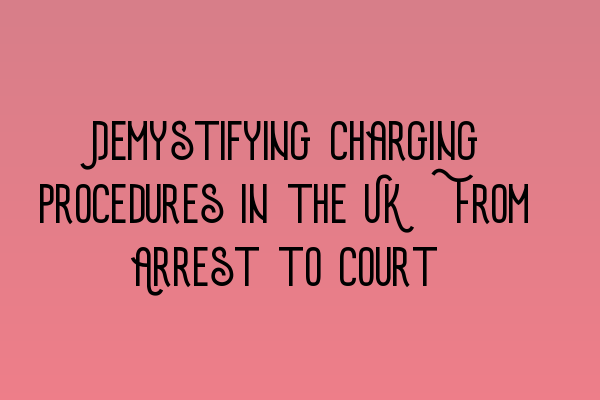Demystifying Charging Procedures in the UK: From Arrest to Court
When it comes to criminal charges in the UK, there can be a lot of confusion and uncertainty. Understanding the charging procedures is essential for both defendants and their legal representatives. In this article, we will demystify the process from arrest to court, providing you with a comprehensive overview of the journey.
Arrest and Detention
The first step in the charging process is the arrest. If a law enforcement officer has reasonable grounds to suspect that the person has committed an offense, they may be arrested. The arrested individual will then be taken to the police station for further questioning and detention.
During detention, the police will gather evidence, interview the suspect, and determine whether there is enough evidence to charge them with a specific offense. This process must adhere to the rules of evidence and the suspect’s legal rights.
Charge or Release
After the police have gathered sufficient evidence, they will make a decision whether to charge the suspect or release them. If there is enough evidence, the police will formally charge the individual with the alleged offense. The charge will outline the specific offense committed and the date and time of the court hearing.
If, on the other hand, the evidence is deemed insufficient, the police may release the suspect without charges. This can happen if there is not enough evidence, if the offense is minor, or if the police believe that further investigation is required.
Bail and Remand
If the suspect is charged with a more serious offense, the police may decide to bring them before a court for a remand hearing. During this hearing, the court will decide whether the suspect should be granted bail or kept in custody until their trial.
If bail is granted, the suspect may be required to provide certain conditions, such as surrendering their passport, attending regular check-ins with the police, or residing at a specific address. Failure to comply with these bail conditions can result in the revocation of bail and the suspect being returned to custody.
On the other hand, if the court determines that the suspect poses a flight risk or a danger to the public, they may be remanded in custody until their trial. This ensures their presence in court and the safety of the community.
Court Proceedings
Once the suspect has been charged and, if necessary, released on bail, the case will proceed to court. The court proceedings will involve a series of stages, including the plea hearing, trial preparation, and the trial itself.
During the plea hearing, the defendant will have the opportunity to enter a plea of guilty or not guilty. It is crucial for individuals facing criminal charges to seek legal representation at this stage, as their plea can have significant consequences for the case.
After the plea hearing, both the defense and the prosecution will engage in trial preparation, including the gathering of evidence, calling witnesses, and preparing their arguments. This process aims to ensure a fair and just trial for all parties involved.
The trial itself will see the presentation of evidence, examination and cross-examination of witnesses, and the opportunity for the defense to present their case. The court will carefully consider all the evidence and make a decision based on the law.
Conclusion
Navigating the charging procedures in the UK can be complex and overwhelming. From the initial arrest to court proceedings, every step of the journey requires careful attention and expert legal representation. By understanding the process and seeking the assistance of experienced professionals, individuals can ensure that their rights are protected and their case is handled with the utmost professionalism.
Related Articles:
- Legal Representation for Delaware LLCs in the UK: Expert Advice
- SQE Exam Prep: Essential Study Materials for Aspiring Solicitors
- Expert Testimonies in UK Courts: Building Strong Cases
- Demystifying the Solicitors Qualifying Examination Format
- SQE Exam for International Lawyers: Challenges and Success Strategies
